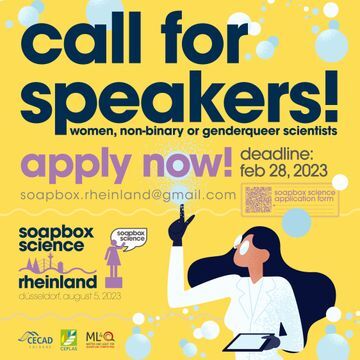Apply for Soapbox Science 2023
Soapbox Science is a public science communication event promoting women and non binary scientists and the science they do. CEPLAS is supporting the event, as this can be a great opportunity for female* researchers to present their research to a broader public and disseminate science in an accessible and engaging way. At the same time this is a great platform to increase the visibility of women and non-binary persons in science and challenge some of the stereotypes and preconceptions about who is a scientist.
We would like to encourage you to apply even if you don’t have previous experience in science communication. Speakers can range from early PhD students to senior researchers.
The local event Soapbox Science Rheinland is a collaborative effort between Heine University Düsseldorf and University of Cologne (CEPLAS, CECAD, ML4Q).
You can apply to be a speaker until February 28th by following this [link]
Alisandra Denton, Adélaïde Raguin and Priyamedha Sengupta, CEPLAC speaker at the Soapbox Science Rheinland Event in 2021 in Cologne formulated a joint statement about their motivation to attend the Soapbox Science Event:
"Increasing the visibility of women in science plays a critical role in changing stereotypes and thereby lived experiences for women in STEM.
First, visibility is important so that women in STEM can be role-models and help inspire the next generation to pursue a scientific career. We hope that increased current visibility helps great female scientists throughout history receive their earned recognition, as for instance, the school curriculum we grew up with did not devote much or any time to great female scientists.
Second, visibility is important to help normalize the presence of women in science, particularly in the higher ranks of the scientific professional ladder where women are consistently underrepresented. There is an all-to-common subconscious—and unfortunately also sometimes conscious—assumption that women don't belong or aren't qualified for high profile scientific positions. While in reality, this often reflects practical choices, such as those made by many women who leave science for less time-intensive or more stable jobs in order to care for their families. Moreover, such a "women don't belong" belief works as a self-fulfilling prophecy, as women who feel alienated, or like they will not have a fair chance to succeed in a STEM field, will very reasonably take their talents elsewhere.
Overall, we hope increased visibility helps push back against harmful stereotypes, both by piquing the interest of talented young women and encouraging them to enter STEM fields, and to help create a welcoming and gender diverse environment where women can thrive throughout their careers."
